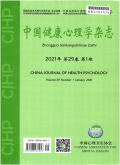中国健康心理学杂志2024,Vol.32Issue(4):562-567,6.DOI:10.13342/j.cnki.cjhp.2024.04.016
应激系统理论干预对主动脉夹层术后情绪状态和心理弹性的影响
Effect of intervention based on stress system theory on emotional state and resilience after aortic dissection
摘要
Abstract
Objective:To analyze the effect of stress system theory on emotional state and resilience of patients with aortic dissection after operation.Methods:Ninety-eight patients with aortic dissection who underwent surgical treat-ment in our hospital from December 2021 to December 2022 were randomly divided into two groups.The control group(49 cases)received routine clinical intervention,while the study group(49 cases)received intervention based on stress system theory.The emotional state,resilience,social support,subjective well-being and quality of life were compared between the two groups before and after intervention.Results:After the intervention,the scores of SAS and SDS in the study group were lower than those in the control group(t=-8.020,-10.104;P<0.05).After interven-tion,the scores of tenacity,self-reliance and optimism in CD-RISC in the study group were higher than those in the control group(t=6.887,8.137,7.658;P<0.05);After intervention,the scores of objective support,subjective support and utilization of support in the study group were higher than those in the control group(t=5.450,6.458,7.813;P<0.05);After the intervention,the scores of satisfaction and interest in life,depression or happy mood,en-ergy,worry about health,control of emotion and behavior,relaxation and tension in the study group were higher than those in the control group(t=7.494,11.224,7.991,8.002,7.160,4.629;P<0.05).After intervention,the scores of physiology,psychology,social relationship and environment in the study group were higher than those in the control group(t=7.498,5.512,10.638,7.877;P<0.05).Conclusion:The intervention based on stress system theory has significant effect on patients with aortic dissection after operation.It can effectively improve the emotional state of patients,enhance their psychological resilience and social support level,and improve their subjective well-being and quality of life.关键词
主动脉夹层/应激系统理论/情绪状态/心理弹性/幸福感/社会支持/生存质量Key words
Aortic dissection/Stress system theory/Emotional state/Psychological resilience/Well-being/So-cial support/Quality of life分类
医药卫生引用本文复制引用
周付娇,许雪..应激系统理论干预对主动脉夹层术后情绪状态和心理弹性的影响[J].中国健康心理学杂志,2024,32(4):562-567,6.基金项目
河南省科技攻关计划项目(编号:202102310496) (编号:202102310496)

